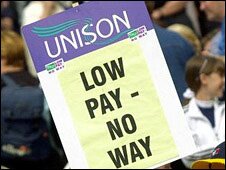Why some ‘British workers’ have a right to be angry
 The recent British Jobs for British Workers union strikes sparked a big debate on whether UK firms were right to employ people from Europe to undercut local workers. We may want to allow Europeans the opportunity to work in the UK, but how far should this go?
The recent British Jobs for British Workers union strikes sparked a big debate on whether UK firms were right to employ people from Europe to undercut local workers. We may want to allow Europeans the opportunity to work in the UK, but how far should this go?
It is not unusual for British firms to now actively look for staff outside the country and undermine conditions bargained for here. In fact, these laws offer firms unprecedented bargaining power to companies. In such cases, why wouldn’t workers feel angry?
Around 2006, local carehome company Fremantle Trust sent representatives to Hungary to recruit people to work in its Barnet care-homes.
Local careworkers were suffering at the time: at the end of 2006, the trust revealed a harsh new employment contract for local careworkers who’d been transferred from Barnet council to the trust’s employ when the council outsourced its care contracts.
With the new employment contract, Fremantle careworkers lost the weekend enhancement pay many depended on for a liveable wage, as well as their longstanding sick leave and annual leave allowances. The cuts meant that some careworkers lost as much as £300 a month in salary immediately.
Told to sign the new contract or leave, the careworkers entered a bitter industrial dispute with the trust – a dispute that has yet to be resolved.
Offshore recruitment was interpreted as an attempt to source workers on inferior terms and conditions.
“We were concerned about why they needed to go so far to recruit,” Barnet Unision branch secretary John Burgess told me.
“It felt like they were trying to import cheap but grateful workers. We were concerned for their term and conditions. We had no involvement in the recruitment, and so had no knowledge about what training they had.”
He said that not many of the workers recruited in Hungary stayed long at Fremantle carehomes.
Care-worker and union organiser Lango Gamanga said the few Hungarian workers who were still working in Fremantle carehomes would not want to speak on the record in case their employment was affected.
Fremantle’s representatives have not responded to repeated requests for comment on the Union’s concerns or to this article.
---------------------------
| Tweet |
Kate Belgrave is a regular contributor to Liberal Conspiracy. She is a New Zealander who moved to the UK eight years ago. She was a columnist and journalist at the New Zealand Herald and is now a web editor. She writes on issues like public sector cuts, workplace disputes and related topics. She is also interested in abortion rights, and finding fault with religion. Also at: Hangbitching.com and @hangbitch
· Other posts by Kate Belgrave
Filed under
Blog ,Economy ,Europe ,Foreign affairs ,Trade Unions
Sorry, the comment form is closed at this time.
Reader comments
Conservatism is the exploitation of MAN by MAN
and Labourism is the exact opposi……nah..to hell with it, its just the same.
Sorry,just could,nt resist it.
“Someone” needs to smack Gordon Brown round the back of the head with a saucepan and tell HIM to FIND a job in Europe and to take David Cameron with him !!!!
… isn’t A Merkel finding our Gordon a job in Europe…?
to paraphrase the great (heh) Sir P White in yesterday’s Guardian, it’s hard to imagine anyone giving Gordon a job organising bathtime…
The saucepan idea is a real starter, r fish. Think yr onto something there.
“With the new employment contract, Fremantle careworkers lost the weekend enhancement pay many depended on for a liveable wage, as well as their longstanding sick leave and annual leave allowances. The cuts meant that some careworkers lost as much as £300 a month in salary immediately.”
This is a different kind of issue to Linsey Oil by a long way. This was the systematic approach by the organisation to undermine the local market by a long way. This is a case of employment rights and what an employer can rescind and under what circumstances, it’s not really a British vs European issue.
Just got this from the BBC ( Gordon’s “Great Bargain” idea ).
Quote:
The prime minister brushed aside the suggestion that he was tempted to step down to become the “world’s financial regulator”.
He said: “There is no possibility anyway of a job called Global Financial Regulator. I want get on with the job I’m doing.
“My priority is to help people in this country who are facing problems with their mortgages, problems with their jobs and problems with small business finance.”
A Merkel tried to shove him into a non-existent job- hehehe
And he thinks repossessing someone’s home every 7 minutes, flinging half a million onto Job Seekers ( in Europe ), and bankrupting companies at a faster rate of knots that the Titanic sailed into an iceberg, is doing a “good job”.
That saucepan idea is really getting me going!
Hi Lee,
Not supposed to be a British workers vs European ones discussion as such – it’s a discussion around employers looking offshore for cheaper options to undermine local terms and conditions, at a time when they were doing exactly that. I think that’s what yr pointing out?
Off the top of my head (will get into this more this evening when I get home) – there has been much said in the media here about refinery offshore contracting being used to undermine of local terms and conditions. Employers have insisted that that was not the point of the exercise that sparked recent strikes, and offshore workers came in on the same terms and conditions and salaries, etc – that the contracts weren’t cheaper.
That is surely a starting point for a discussion about the realities of seeking workers from other countries in a lot of instances – in the Fremantle one, it seems it was done to bring in people at cheaper rates than people were being paid here. That was certainly the union’s view in Barnet.
I don’t think that makes the Barnet example irrelevant to the general discussion we’ve been having on the point of offshoring – far from it. It’s another important offshoot – certainly not to be dismissed. The women at Fremantle have had a dreadful time since their salaries were cut, and if attempts were made to undermine their terms and conditions – particularly at a time when they were taking industrial action to fight cuts to try and save their salaries – then that is worthy of comment in a discussion about local workers and their concerns about their environment.
“That is surely a starting point for a discussion about the realities of seeking workers from other countries in a lot of instances – in the Fremantle one, it seems it was done to bring in people at cheaper rates than people were being paid here. That was certainly the union’s view in Barnet.”
yes, precisely. It’s one thing to be protectionist, which I don’t agree with, but it’s another to protect against the employer actively looking to undermine the local market to drive down the cost of employing people. It’s a bit of a balancing act with regards to job competition, but the case is far too extreme in this example to simply be about fair competition between employees.
just another thing for now, Lee – I was under the impression that refinery workers WERE concerned that contracts were going to companies that employed workers at cheaper rates, and that their dopey union Unite had actually AGREED to that:
http://www.telegraph.co.uk/finance/newsbysector/energy/oilandgas/4549925/Union-agreed-working-conditions-for-Italian-workers-in-British-jobs-row.html
which hardly surprises
certainly agree with your point above.
I don’t disagree that that’s what they perhaps thought at first, but that doesn’t excuse the length of their protest in my eyes. They became an unreasonable mob, and I have no time for that personally.
I don’t disagree with employers contracting to contractor groups, providing the contractors pay market, or around market, rates to their employees…I don’t actually think contractors or employers should be hamstrung from offering a slightly below market rate if they feel that’s what they need to do.
But slashing the benefits and pay to the level they did at Freemantle is a whole different ball game.
Oh, and Unite are a bunch of idiots, so I’m not surprised at that either.
Can we stop propagating the myth that the Italian and Portuguese workers were hired “on the cheap”? That was found by the arbitration service Acas to be UNTRUE. Our papers however were more than happy to perpetrate the lie.
Anything to stoke xenophobia.
I explained this here http://mymarilyn.blogspot.com/2009/02/half-truths-about-lindsey-strikes.html
Will look at your post this evening, Claude.
I never did get a final answer round the point you’ve made, though – why did refinery companies seek offshore input if those contracts weren’t cheaper? What other point is there to a contracting exercise (apart from addressing a skills shortage, which doesn’t appear to have been the case for refinery workers)?
And what does cheaper mean, exactly? Speaking in the generic sense, different groups of workers can be paid a rate that is apparently the same – but a contracting employer won’t be making pensions contributions, for instance, or paying overheads, or paying maternity leave allowances, or may not need to pay such close attention to
working time directives, etc, and so may apparently be in a position to deliver contracts more quickly – and therefore at a cheaper rate. Salaries are but an aspect of worker costs.
Undercutting takes many different forms, as well, and in some cases, an apparently cheaper contract ends up being nothing of the kind. Fremantle, for example, appeared a cost-effective option on paper when bidding for care contracts at Barnet. Its proejcted costs depended, however, on cutting staff salaries.
This, by the council’s own admission in 2007 cabinet committee reports, wasn’t quite as succcessful a cash-generator as they’d hoped it would be. Catalyst Housing (Fremantle’s care provision partner) is, as a result, pushed for an increased settlement (some eight million, last I heard) with the council – a claim which, at various points, has seemed headed for arbitration.
Right you with re: Unite, Lee.
No-one seems to have mentioned up to this point that the Hungarian workers who did get jobs out of this, well, got jobs out of it. Isn’t that a good thing?
11. Claude we do not know unless we see the tenders and the winning quotation. When drafting a quotation, the way one can weights the various cost items is often very significant; it is not just about final price. There is also the various obligations which are often written into a contract often to do with apportioning risk which can also be a significant factor in whether a contractor wins a tender.
One has to assume that ACAS had access to those details, Charlie.
Kate, what’s the status of the Fremantle case? I didn’t realise it was still going on. It would seem to me that the careworkers had pretty much a slam-dunk case.
No-one seems to have mentioned up to this point that the Hungarian workers who did get jobs out of this, well, got jobs out of it. Isn’t that a good thing?
Apparently not. Presumably that is becasue they are foreigners…
Andrew,
The dispute hasn’t been resolved – Fremantle has refused to return the workers to their original contract, and so strike action continued last year. The last I heard – about ten days ago – was that they’d asked to talk to the union again. Don’t think it’s ever been a slam dunk case, unfortunately – companies are permitted to dismantle TUPE for business reasons and I don’t believe the union has ever been advised that Fremantle’s action was illegal. Barnet Unison would have made a legal challenge if it had.
To ad and those above who have said that nobody gives a stuff for the Hungarian people who were recruited because they were foreign – au contraire.
The point has never been that these people weren’t worthy of employment , or that the employment of non UK residents is neither here nor there.
The point is – and has been made by Barnet Unison on numerous occasions – that both UK and Hungarian workers suffered under the kind of initiative I’ve described above. UK workers have their terms and conditions undermined by an initiative like Fremantle’s, and workers from other countries have an equally bad time as they are brought in to tolerate poor wages and terms and conditions that are already been forced on local people. Barnet Unison has told me several times that the Hungarian workers who were brought here found things so difficult – the wages almost impossible to live on, and the number of shifts necessary to make ends meet, once the weekend enhancement was cut – that the majority of recruits didn’t stay.
All workers involved in this one, whether they were Hungarian, or Barnet residents, suffered. Nobody is dismissing foreign workers.
well said kate, I was going to say that too. If these practices are replicated across Europe, none of the workers win because they’re in constant fear of being undermined by someone cheaper.
Kate, thanks for that. I recently did some reading up on TUPE because it might affect my personal situation – that’s what led me to believe they would have a “slam-dunk” case.
15. Lee Griffin . Based upon my personal experience of the mistakes I have made I would never assume anything about a contract- the devil is is in the detail . What issue which is not being mentioned is productivity. The Telegraph mentions the unions negotiated a tea break which may have raised concerns by the employers regarding reduction in productivity. What this issue does raise is the importance unions must give to productivity. It is not just what a worker is paid per hour but how much they achieve during a shift and how many people are employed. What the employer is concerned about is total labour cost. If a firm can employee less people , agree that less onerous overtime payments, then the standard hourly rate may not be lower but the total cost of labour to the employer will be lower.
Andrew – happy to talk more about TUPE if you’d like – let me know if you want a discussion on email. It is most certainly true that employers can dismantle TUPE if they can prove that the business requires different (read ‘lesser’) terms and conditions for their inherited staff.
The Fremantle case is one example. Another is Greenwich Leisure Limited’s dismantling of TUPE when they took over leisure facilities at Hammersmith and Fulham.
Will come back with few more thoughts on the contracts.
“It is not unusual for British firms to now actively look for staff outside the country and undermine conditions bargained for here.”
And to think, there are still people who argue that a minimum wage has no employment effects.
I have read and re-read the arguments for and against protectionism, and I still think that in a world-wide recession a country has to look after its own nationals first when there is mass unemployment. It will not be the Hungarian government (i.e. taxpayers) paying the unemployment benefits of the British workers who could have done the jobs being done by Hungarians, or the Italians paying the unemployment benefits of British refinery workers.
There is little likelihood of Brits getting jobs abroad in the current situation unless there are acute skills shortages.
“It will not be the Hungarian government (i.e. taxpayers) paying the unemployment benefits of the British workers who could have done the jobs being done by Hungarians, or the Italians paying the unemployment benefits of British refinery workers.”
A good point, and shows certainly the discrepancy in the EU having a more centralised fund on such matters.
“There is little likelihood of Brits getting jobs abroad in the current situation unless there are acute skills shortages.”
There’s little likelihood of Brits getting jobs in Britain in the current situation unless there are acute skills shortages. The problem, as always, is lack of appropriate jobs (or lack of appropriate skill sets) on a global scale, not which nationality someone is from.
The cost of paying benefits to more unemployed people in Britain might well be a lot less than the costs of introducing protectionism, with all the associated tit-for-tat effects of other countries closing off export markets and spending more on goods and services that are unnecessarily expensive. Once again, it is all about the seen and unseen.
A few more thoughts:
I’d make the point again that the sort of recruitment I’ve described in this post can only be about economics – it’s about getting skilled staff in at the least possible expense.
I find it hard to believe that the contracts sublet around the refinery disputes were any different – that there was absolutely no economic advantage for the contracting companies in following the subletting course. Am very happy to stand corrected on that, not least because it’d be a first for me – finding a company that let a contract on anything other than an economic motivation.
I’ve been involved in contract negotiation – and contracts disputes – from a TU perspective a number of times now, and have found there are two reasons why contracts are let – either contractors are able to provide a skills set that the source organisation can’t, and/or outsourcing is cheaper.
It is inevitable – even in the public sector’s so-called best value environment – that the price of a contract is THE point on which a contract is let. The decision is inevitably an economic one. And to be fair to business – why would it look for anything other than the
most cost effective deal? The whole point of business is to drive profit and create jobs – or so the romance goes. I personally don’t have a problem with that – I have strong capitalist inclinations myself and think there is much to be said for making profits and
creating jobs. I certainly like having a good job myself, and I like making money, and I can’t imagine I’d like either of those things to end. I ain’t that much of a socialist.
The point to remember is that business is not inclined to regulate itself, and that that in itself can become extremely expensive for taxpayers like you and me – if we’ve learned nothing else in the last few months, we’ve learned that. It’s the job of the likes of unions – and the state, if I may – to regulate excesses in the workplace and in the boardroom. Left to its own devices, business will follow the money. Fair play.
I noted last month that the originating refinery companies argued here and there that the main reason for the subletting of the contracts was skills shortage at a time when the local employment picture was better than it is now, but that simply doesn’t square
with the worker argument that local staff were present and capable. Jobs were subsequently found in those contracts for local workers – did that mean they suddenly acquired the skills they apparently didn’t have at the time the contracts were outsourced? Somebody’s not coming clean.
And sure, plenty have argued – some on this thread – that dollar for dollar, offshore employees cost the same as local ones in terms of salary. I would agree with the person who said on this thread that the devil would be in the detail of the contract on this.
Speaking generically, I’d say that salary costs make up a big chunk of contract costs, but there’s more to things than that.
An offshore contract winner might agree to cover worker insurance costs, or have its people on a cheaper health scheme, or have smaller HR costs. Perhaps an offshore contractor is paying smaller overtime than competitor companies.
A contractor could tell unions, for instance, that it paid its workers overtime – but not reveal the exact totals, or the conditions of that overtime.
You’ll note in my original post here, I said that the Fremantle Trust cut weekend enhancement pay for its careworkers, who had been receiving time and a half pay on Saturday, and double time on weekends. The Trust didn’t entirely eliminate overtime though – off the top of my head, people still got an extra couple of quid for working those days. The Trust thus remains in a position to argue that it still pays overtime for unsocial hours. It just doesn’t make much of a payment, and it slashed the original payments so severely that people’s lives were badly affected.
I’d also make the point that you do get the odd contract tenderer/winner that is – how can I put this – economical with the truth. I remember one outsourcing contract negotiation involving my then-union branch where the contract winner vowed – hand on heart – to honour transferred council workers’ salaries, terms and conditions, and observe TUPE. It was only a matter of weeks later that it presented workers with a new contract on lesser wages, and terms and conditions. That company must have been working on that new, harsher contract even as it was meeting with us and pledging its allegiance to existing terms and conditions.
Few thoughts for now, anyway.
27. Kate excellent article. Excellent comments on overtime and bonus payments coupled with length of working day. Let us say a working day is 7.5 hours . If overtime is only paid when more than 8.5 hours is worked and a certain task has to be completed before people finish for the day this can result in people working 7.75 -8.25hrs a day of which .25-.75 hrs is free. On a regular basis this can significantly reduce the total cost of labour.
Hi Kate,
I think I’m ok for the moment but thanks for the offer.
No worries, man. Hope it turns out. Cheers, Kate.
Reactions: Twitter, blogs
-
Liberal Conspiracy
New blog post: Why some ‘British workers’ have a right to be angry http://tinyurl.com/ar5hju
[Original tweet]
Sorry, the comment form is closed at this time.
You can read articles through the front page, via Twitter or RSS feed. You can also get them by email and through our Facebook group.
» The backlash to Credit Ratings Agencies gathers steam
» How a Wealth Tax could work and get around problems
» The London Evening Standard gives up on election journalism
» A Catholic writes: gay marriage was our idea, Bishops should embrace it
» What can activists learn from how OccupyLSX fared?
» Libdems: learn from Labour and listen to voters not your leader
» Oi Daily Mail – who you calling a “Plastic” Brit?
» We Libdems will need more than an apology if the NHS bill passes
» The 50p tax will raise more than £6billion according to HMRC itself
» You just can’t be a Monarchist and believe in meritocracy
» Ken Livingstone and recent controversies – a defence
|
11 Comments 33 Comments 34 Comments 21 Comments 32 Comments 48 Comments 11 Comments 24 Comments 90 Comments 69 Comments |
LATEST COMMENTS » Bob B posted on We didn't talk about civil partnership – ours was a marriage » Bob B posted on We didn't talk about civil partnership – ours was a marriage » lucy posted on We didn't talk about civil partnership – ours was a marriage » Trooper Thompson posted on UKIP try to dismiss comparison to BNP » lucy posted on We didn't talk about civil partnership – ours was a marriage » Mr S. Pill posted on A Catholic writes: gay marriage was our idea, Bishops should embrace it » Bob B posted on We didn't talk about civil partnership – ours was a marriage » Shreen posted on "Whatchu lookin at rich boy?" Plan B's new video blasts Cameron » Churm Rincewind posted on We didn't talk about civil partnership – ours was a marriage » Tris posted on We didn't talk about civil partnership – ours was a marriage » Pinkie posted on We didn't talk about civil partnership – ours was a marriage » Bob B posted on We didn't talk about civil partnership – ours was a marriage » damon posted on UKIP try to dismiss comparison to BNP » Chaise Guevara posted on The London Evening Standard gives up on election journalism » damon posted on A Catholic writes: gay marriage was our idea, Bishops should embrace it |










